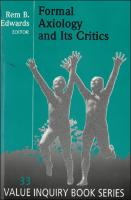Formal Axiology and Its Critics
Contributor(s)
Edwards, Rem B. (editor)
Language
EnglishAbstract
Formal Axiology and Its Critics consists of two parts, both of which present criticisms of the formal theory of values developed by Robert S. Hartman, replies to these criticisms, plus a short introduction to formal axiology.Part I consists of articles published or made public during the lifetime of Hartman to which he personally replied. It contains previously published replies to Hector Neri Castañeda, William Eckhardt, and Robert S. Brumbaugh, and previously unpublished replies to Charles Hartshorne, Rem B. Edwards, Robert E. Carter, G.R. Grice, Nicholas Rescher, Robert W. Mueller, Gordon Welty, Pete Gunter, and George K. Plochmann in an unfinished but now completed article on which Hartman was working at the time of his death in 1973.Part II consists of articles presented at recent annual meetings of the R.S. Hartman Institute for Formal and Applied Axiology that continue to criticize and further develop Hartman's formal axiology. An article by Rem B. Edwards raises serious unanswered questions about formal axiology and ethics. Another by Frank G. Forrest shows how the formal value calculus based on set theory might answer these questions, and an article by Mark A. Moore points out weaknesses in the Hartman/Forrest value calculus and develops an alternative calculus based upon the mathematics of quantum mechanics. While recognizing that unsolved problems remain, the book intends to make the theoretical foundations and future promise of formal axiology much more secure.
Keywords
Philosophy; 19th & 20th Century Philosophy; Ethics & Moral PhilosophyDOI
10.1163/9789004495968ISBN
9789004495968, 9789004495968Publisher
BrillPublisher website
https://brill.com/Publication date and place
2021Imprint
BrillSeries
Hartman Institute Axiology Studies, 33Classification
Western philosophy from c 1800


 Download
Download Web Shop
Web Shop